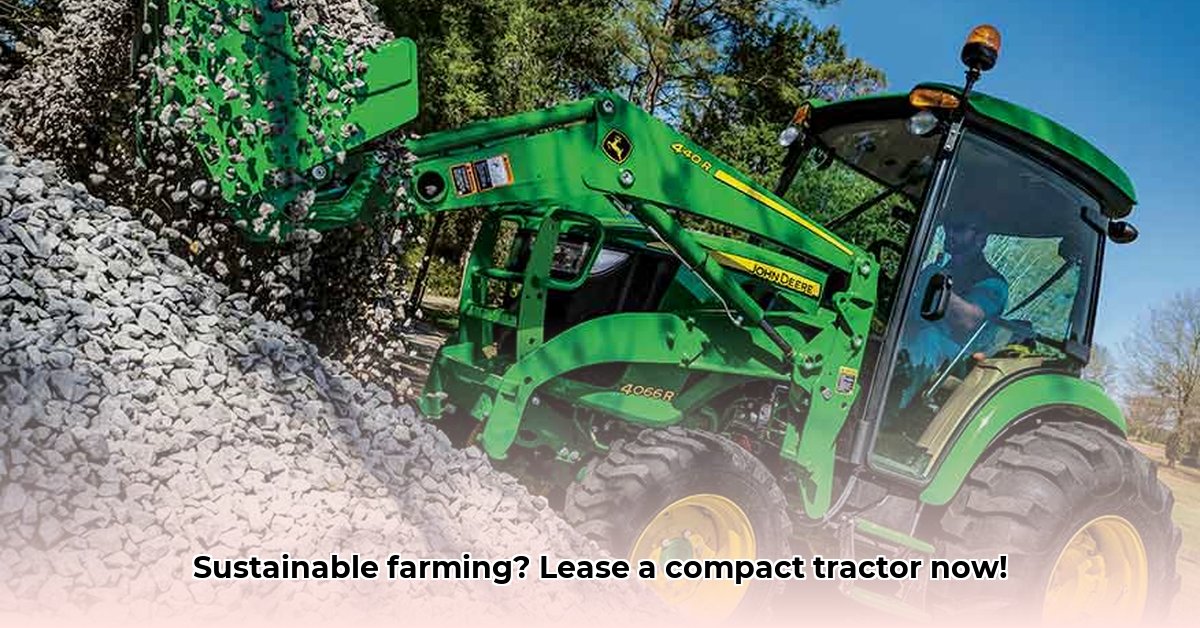
Understanding Compact Tractor Leasing: More Than Just Renting
Farming is a capital-intensive business. Equipment costs can significantly impact your bottom line. Leasing a compact tractor offers a smart alternative to outright purchase, especially for farmers focused on sustainable practices. Instead of a large upfront investment, leasing allows you to make regular payments over a predetermined period. At the lease's end, you can return the tractor, extend the lease, or even purchase it. This flexibility enables adaptation to changing farm needs and technological advancements. For more options, check out other brands like New Holland tractors.
Why Lease? Leasing offers several key advantages:
- Reduced Upfront Costs: Avoid a significant initial investment, freeing up capital for other crucial farm expenses like seeds, fertilizer, or facility improvements.
- Access to Newer Technology: Lease agreements allow you to upgrade to newer, more fuel-efficient models as technology evolves, enhancing productivity and minimizing your environmental impact.
- Potential Tax Benefits: Leasing may provide tax advantages; consult a tax professional for personalized guidance (Note: Tax laws vary, professional advisement is crucial).
- Flexible Payment Schedules: Tailor payments to your income cycles, reducing financial pressure during low-income periods.
Exploring John Deere Financial's Leasing Programs
John Deere Financial offers a range of compact tractor leasing programs designed for various farm sizes and budgets. Their programs often include competitive interest rates and flexible payment structures that align with seasonal shifts in farm income. Many programs emphasize fuel-efficient models, helping you reduce operational costs and your carbon footprint.
Key Features of John Deere Financial's Leasing Programs:
- Flexible Lease Terms: Choose a lease duration that best suits your farming needs, ranging from short-term to long-term agreements.
- Customizable Payment Schedules: Payments can be structured to accommodate your unique income patterns, easing seasonal financial strain.
- Fuel-Efficient Model Options: Access to newer, more fuel-efficient models, minimizing fuel consumption and environmental impact.
- Potential Tax Advantages: Leasing may offer potential tax benefits; consult a tax professional for personalized advice. (Note: Always seek professional tax advice).
- Maintenance Options: Some agreements may include maintenance plans, reducing unexpected repair expenses.
Sustainability and Compact Tractor Leasing: A Greener Future
Leasing a compact tractor can significantly contribute to a more sustainable farming operation. Newer models often boast enhanced fuel efficiency, directly translating to lower running costs and reduced emissions. This approach benefits both your profitability and the environment.
"By leasing a fuel-efficient model, I reduced my fuel consumption by 18%, resulting in cost savings and a smaller carbon footprint," says Farmer Miller, from Miller Family Farms, Iowa. His experience underscores the potential for substantial environmental and financial benefits through leasing.
However, remember that responsible farming practices extend beyond equipment choices. Sustainable farming necessitates a holistic approach, combining efficient machinery with crop rotation, water conservation techniques, and soil health management.
Making Informed Financial Decisions
Before committing to a lease, careful financial planning is essential. Thoroughly assess your current financial situation and project future income and expenses. Compare quotes and lease terms from multiple providers to identify the most favorable option.
Financial Planning Checklist:
- Budget: Determine a realistic budget for monthly lease payments.
- Tractor Needs: Identify your specific needs in terms of horsepower, attachments, and features.
- Lease Duration: Choose a lease length that aligns with your needs and financial capabilities.
- Lease Terms: Thoroughly understand all terms and conditions of the lease agreement.
- Payment Options: Explore different payment structures to find one that matches your cash flow.
- End-of-Lease Options: Clearly understand your options at the lease's end: return, renew, or purchase.
- Maintenance Costs: Inquire about maintenance costs, whether included or available as an add-on.
Your Step-by-Step Guide to Leasing a Compact Tractor from John Deere Financial
- Research: Explore John Deere Financial's leasing programs and compare them with offerings from other providers.
- Consultation: Contact a John Deere Financial representative to discuss your specific requirements and receive personalized quotes.
- Application: Complete the lease application accurately and provide all necessary financial documentation.
- Review and Approval: Carefully review the lease agreement and ensure you understand all terms and conditions before signing. Await approval from John Deere Financial.
- Finalization: Once approved, sign the lease agreement.
- Delivery and Setup: Arrange for the delivery and setup of your new compact tractor.
Leasing a compact tractor can significantly enhance your farming operations, leading to cost savings and increased sustainability. Contact John Deere Financial to learn how leasing can positively impact your farm's future.